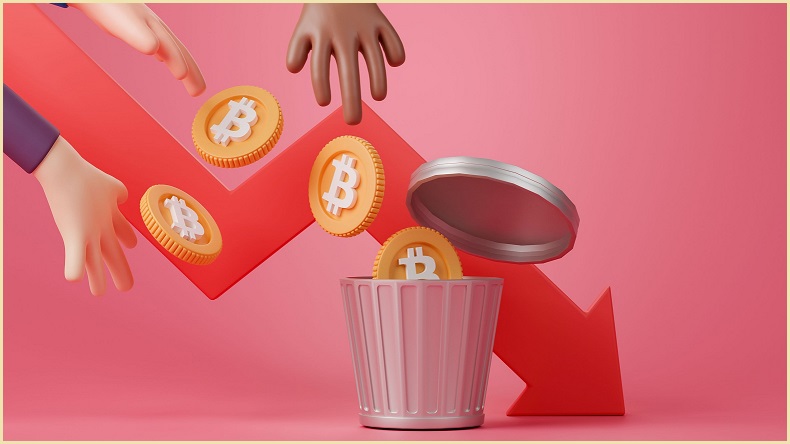Tesla and Microsoft have taken wind out of cryptocurrency’s sails, with revelations that electric vehicle manufacturer Tesla sold three-quarters of its Bitcoin holdings even as Microsoft banned blockchain and non-fungible tokens (NFTs) from its Minecraft game.
Tesla – which bought $1.9 billion ($US1.5 billion) worth of the cryptocurrency last year amidst the ongoing enthusiasm of founder Elon Musk for cryptocurrencies – sold $1.3 billion ($US936 million) worth of its Bitcoin holdings last quarter, according to new quarterly filings that showed the company’s first decline in profit for more than a year.
The company’s ongoing production challenges – which have been exacerbated by supply-chain issues afflicting many automotive manufacturers – were significant enough to prompt Musk to join the earnings conference call, where he said he was prompted to turn up because of the “tough situation” caused by ongoing COVID-19 shutdowns in China.
“If there’s only good news,” he said, “I won’t be on the call”.
Musk assured analysts and stakeholders that he is “committed to the long term” support of the electric vehicle behemoth he founded – although its dumping of Bitcoin suggests that sentiment no longer extends to that cryptocurrency.
The company remains “open to increasing our Bitcoin holdings in the future”, Musk said, noting that it had not sold any of its holdings of Dogecoin – the alternative cryptocurrency that was created as a joke but became a significant cryptocurrency after Musk drummed up support for it on Twitter.
News of the sale caused Bitcoin’s price to drop sharply, wiping $1,318 ($US910) from the value of one coin within half an hour as traders reacted to the news – and helping drive Bitcoin down 9 per cent in the last week.
It wasn’t the first time Musk’s vacillations on cryptocurrency have caused problems for investors that have followed his every move: cryptocurrency prices have frequently risen after a single tweet, for example, but investors have been burnt and Bitcoin crashed in May after Musk said he would stop allowing people to buy Teslas with it.
Crypto gets a reality check
Whether the latest move has long-term repercussions for Australian investors – who made more than $3 billion from cryptocurrency last year alone – remains to be seen.
Cryptocurrency has struggled to make inroads into many commercial spaces, with Deel’s recent State of Global Hiring report finding that employers in Australia and other APAC countries are the world’s most reluctant to pay remote workers in cryptocurrency – with just 2 per cent of all payments by APAC employers relying on crypto during the second half of 2021.
By contrast, remote workers in South and Central America were the most likely to be paid in cryptocurrency – two-thirds of crypto payments went to that region, likely related to El Salvador’s decision to make Bitcoin its legal tender.
How that changes in the long term will depend on a range of factors – but with regulation tightening and the ATO this year prioritising detection of crypto profits there is little doubt investors need to fine-tune their expectations and investment strategies.
“Regulatory clarity will boost investor confidence and protection,” GlobalData thematic analyst Amna Mujahid recently predicted in flagging her expectations for the cryptocurrency market this year.
“Cryptocurrency advocates and companies will support regulators to overcome sceptics and legitimise their currency,” Taylor said, noting that “the main obstacle for crypto is the sceptics and delayed regulation, all of which will be addressed in 2022.
“How this regulation will look in consensus is still uncertain,” she added, “but if you see a bright crypto future, make sure you support regulatory efforts to demystify it.”
Musk isn’t the only high-profile entity changing his tune on crypto-related assets, however.
Despite Mujahid predicting that rapid acceptance of NFTs “is not going to be all hype” this year, that once-buoyant market got a reality check after Microsoft banned them from its Minecraft gaming platform.
One of Minecraft’s core goals is to remain “a community where everyone has access to the same content,” Microsoft said in announcing this week that it will prevent third-party developers from linking blockchain and NFT platforms to the massive online gaming world.
“NFTs… can create models of scarcity and exclusion that conflict with our guidelines and the spirit of Minecraft,” Microsoft said, which is based on “values of creative inclusion and playing together.”
NFTs “are not inclusive of all our community and create a scenario of the haves and have-nots,” the company said, noting that “the speculative pricing and investment mentality around NFTs takes the focus away from playing the game and encourages profiteering, which we think is inconsistent with the long-term joy and success of our players.”










